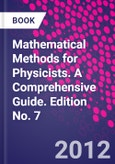Table of Contents
1. Mathematical Preliminaries 2. Determinants and Matrices 3. Vector Analysis 4. Tensors and Differential Forms 5. Vector Spaces 6. Eigenvalue Problems 7. Ordinary Differential Equations 8. Partial Differential Equations 9. Green's Functions 10. Complex Variable Theory 11. Further Topics in Analysis 12. Gamma Function 13. Bessel Functions 14. Legendre Functions 15. Angular Momentum 16. Group Theory 17. More Special Functions 18. Fourier Series 19. Integral Transforms 20. Periodic Systems 21. Integral Equations 22. Mathieu Functions 23. Calculus of Variations 24. Probability and Statistics








